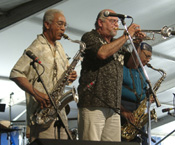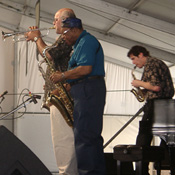| |
Kidd
Jordan & The Improvisational Arts Quintet / Max Roach Quartet
New Orleans LA, 28 April 2001
by Frank Rubolino
September 2001
 The
JazzFest in New Orleans has been going at a strong pace for over 30
years, but it has not held the reputation for being a forum for cutting
edge, innovative music. However, for 2001, the festival did allocate
time for music that does not typically fit the commercial mainstream
tastes of the tens of thousands of people who attend this huge event
spread out over ten stages on the racetrack grounds. When I heard
from band members that Kidd Jordan was re-assembling his Improvisational
Arts Quintet for the festival and had expanded it to a sextet that
included Fred Anderson, Joel Futterman, Alvin Fielder, Elton Heron,
and Clyde Kerr, I decided to make the trip from Houston solely to
see this dynamic lineup. The
JazzFest in New Orleans has been going at a strong pace for over 30
years, but it has not held the reputation for being a forum for cutting
edge, innovative music. However, for 2001, the festival did allocate
time for music that does not typically fit the commercial mainstream
tastes of the tens of thousands of people who attend this huge event
spread out over ten stages on the racetrack grounds. When I heard
from band members that Kidd Jordan was re-assembling his Improvisational
Arts Quintet for the festival and had expanded it to a sextet that
included Fred Anderson, Joel Futterman, Alvin Fielder, Elton Heron,
and Clyde Kerr, I decided to make the trip from Houston solely to
see this dynamic lineup.
The
band played at the inappropriate time of 1 PM in the Jazz Tent to
an unusually large crowd as new music concerts go. Futterman began
with an immediately ambitious solo, and this paved the way for an
incredibly intense, 15-minute assault of the tenor saxophone by Anderson.
He blew with sustained vigor, spewing out round after round of armor-piercing
bullets. An exhausted Fielder told me after the concert that he had
never been pushed to such extremes by a musician as he was accompanying
Anderson's sprint. Fielder did keep pace, and the entire band was
energized by Anderson's performance.
 Kerr showed great forcefulness as the trumpeter of the band. He played
with power and emotion and regularly responded with engrossing free
trumpet outbursts. He was a fine counterbalance between the two tenor
players. When Jordan made his first entry, he initially calmed the
waters with a tender sequence of unexpected quietude, but then he
also began interjecting emotional tenor responses. It all built to
a beautiful crescendo of intensity, with Jordan and Anderson flanking
Kerr and interacting intuitively and wholeheartedly. Futterman continually
emitted acute lines of demarcation, playing with his patented cross-handed
approach to produce a continual stream of charged ions. Heron on electric
bass responded resonantly with ever-changing bass lines filled with
tension and diversification. Kerr showed great forcefulness as the trumpeter of the band. He played
with power and emotion and regularly responded with engrossing free
trumpet outbursts. He was a fine counterbalance between the two tenor
players. When Jordan made his first entry, he initially calmed the
waters with a tender sequence of unexpected quietude, but then he
also began interjecting emotional tenor responses. It all built to
a beautiful crescendo of intensity, with Jordan and Anderson flanking
Kerr and interacting intuitively and wholeheartedly. Futterman continually
emitted acute lines of demarcation, playing with his patented cross-handed
approach to produce a continual stream of charged ions. Heron on electric
bass responded resonantly with ever-changing bass lines filled with
tension and diversification.
Behind
the overt commotion, Fielder mapped out a militant strategy of arrhythmic
drum sequences that kept the fires burning brightly with his uproarious
attack. At one point Futterman joined the horn players with his curved
soprano saxophone, and the wellspring of musical ideas continued
to flow. All musicians were pushed to extreme levels on this set
that was a rewarding tribute to the free spirit inherent in each
of them. The acoustics in the big tent were not perfect, the sound
system was somewhat unbalanced, and the time of the performance should
not have been conducive to igniting the creative juices. Jordan and
the IAQ rose above this and gave a strong performance that hopefully
made converts out of some in the festive crowd.
 I
was quite surprised and pleased to learn that the Max Roach quartet
would be playing after the IAQ. We sometimes take our jazz icons for
granted, but Roach is one musician who deserves all the respect and
appreciation we have to offer. I had first seen the 76-year old super
drummer in 1959 in Pittsburgh with George Coleman and Booker Little,
and again in 1982 with Cecil Bridgewater and Odean Pope, but I was
overly excited about having another opportunity to see this giant
who has reached emeritus status as a musician and who has not slowed
down since he began playing in the early 1940s. I
was quite surprised and pleased to learn that the Max Roach quartet
would be playing after the IAQ. We sometimes take our jazz icons for
granted, but Roach is one musician who deserves all the respect and
appreciation we have to offer. I had first seen the 76-year old super
drummer in 1959 in Pittsburgh with George Coleman and Booker Little,
and again in 1982 with Cecil Bridgewater and Odean Pope, but I was
overly excited about having another opportunity to see this giant
who has reached emeritus status as a musician and who has not slowed
down since he began playing in the early 1940s.
Roach
began with a drum solo in front of an overly packed tent that was
estimated at over 5,000 people. He projected a level of energy that
belied his age. Although his movements going to the stage were slowed,
once he had the drumsticks in his hands, the magic appeared. With
him were Odean Pope on tenor, Eddie Henderson on trumpet, and Tyrone
Brown on bass. They played as their opener the strenuous composition
"It's Time." Breaking out at a fast pace is a well-known trait of
any Roach band, and his finely tuned quartet met the challenge. With
Roach sitting prominently up front, the band blew wholeheartedly on
this and several other classics, including Monk's "Straight No Chaser,"
Billy Harper's "Trying to Get Ready," and Benny Golson's "I Remember
Clifford."
Although
Roach was the focal point, both Henderson and Pope had ample time
for solos that were spurred into high gear by the drummer's prodding.
Brown, who has been associated with Roach for many years, played
a small upright instrument at the frantic pace Roach dictated. A
surprise addition to the show was the appearance of pianist Connie
Crothers, who gave a fine rendition of "The Man I Love" with Roach in duet.
She mixed her freeform style into the melodic tune to give it a unique
twist and a percussive sound in tandem with Roach.
Roach ended the concert giving another solo drum clinic and brought
the audience into the performance with a patterned three-line sequence
that encouraged a two-beat clapping response. The crowd loved it.
The most heartwarming part of the event was the admiration the crowd
showed to this true superstar of the music world. May he continue
to please crowds for many years to come.
|
|
|
|
|

